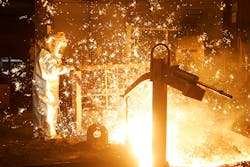Better Late Than Never: OSHA, U.S. Steel Reach Settlement in Injury Reporting Case
In what sounds like a case of good intentions gone bad, U.S. Steel in 2014 disciplined two employees for violating the company’s immediate reporting policy for injuries. The purpose of the policy is to ensure injuries are reported in a timely manner. OSHA, however, claimed the policy punished the workers for reporting injuries, a violation of whistleblower statutes.
The two employees – John Armstrong and Jeff Walters – reported injuries that may have resulted from worksite incidents occurring a few days before the reports were made. The employees claimed they were unaware they had suffered injuries at the time, as symptoms did not develop until later. When Armstrong and Walters reported their injuries, U.S. Steel suspended both of them without pay for violating the company’s immediate reporting policy.
The U.S. Department of Labor filed a lawsuit against U.S. Steel in February, seeking to reverse the disciplinary action taken against the employees and amend the company’s immediate reporting policy.
In a settlement agreement filed July 19 with the United States District Court for the District of Delaware, U.S. Steel agreed to pay Armstrong $877.23 in back wages and interest and pay Walters $471.84 in back wages and interest. The company also agreed to rescind a disciplinary suspension against Derrick Marbley – an employee at the company’s Lorain Tubular facility who filed a complaint with OSHA – and replace it with a written warning that is contingent upon Marbley withdrawing any grievances he filed with respect to the disciplinary action.
U.S. Steel also agreed to rescind its immediate reporting policy and agreed “never to reinstate or enforce the immediate reporting policy or any injury or incident reporting policy containing a temporally restrictive reporting requirement that makes it impossible or impracticable for an employee to comply when he or she is unaware at the time of an incident that he or she sustained an injury or illness.”
“OSHA is extremely pleased with this settlement, which requires the payment of back wages to U.S. Steel employees who were disciplined after reporting of injuries to their employer, along with significant changes in U.S. Steel’s injury and incident reporting policies,” said Richard Mendelson, OSHA regional administrator in Philadelphia. “OSHA and the regional office of the solicitor partnered to negotiate this outstanding agreement, which ensures that employees can properly report on-the-job injuries without fear of retaliation.”
Initial Extent of Injuries Not Known at the Time
According to Mendelson, U.S. Steel’s immediate reporting policy provided “an incentive for employees to not report injuries once they realize they should, since they are concerned that the timing of their report would violate the company’s policy and result in some kind of reprimand.”
Both workers suffered injuries in February 2014. On Feb. 12, Walters, a full-time utility technician at U.S. Steel’s Clairton Plant in Clairton, Pa., found a small splinter lodged in his thumb and extracted it himself. He completed his shift without further incident.
Two days later, his thumb and hand were swollen noticeably, and he received medical treatment for an infection. When he reported the incident to his supervisor, the company imposed a five-day suspension without pay for his violation of the company’s policy. U.S. Steel later reduced the suspension to two days.
On Feb. 15, Armstrong, a full-time laborer at the company’s Irvin Plant in West Mifflin, Pa., bumped his head on a low beam. He was wearing a hardhat and didn’t feel any pain or notice any discomfort at the time. However, several days later, he experienced stiffness in his right shoulder and sought medical treatment, which his representative reported to U.S. Steel as a possible workplace injury. When he met with U.S. Steel’s representative to discuss the issue, the company suspended him for five days without pay.
Both workers filed complaints with OSHA, alleging that U.S. Steel had suspended them in retaliation for reporting workplace injuries. The agency found that in both cases, the company violated the anti-discrimination provision of the Occupational Safety and Health Act, or Section 11(c), when the company used its immediate reporting policy as a basis for sanctioning employees who reported injuries “late.”
Employers are prohibited from retaliating against employees who raise various protected concerns or provide protected information to the employer or the government. Employees who believe that they have been retaliated against for engaging in protected conducted can file a complaint with the secretary of labor for an investigation by OSHA’s Whistleblower Protection Program.
About the Author

Sandy Smith
Sandy Smith is the former content director of EHS Today, and is currently the EHSQ content & community lead at Intelex Technologies Inc. She has written about occupational safety and health and environmental issues since 1990.
